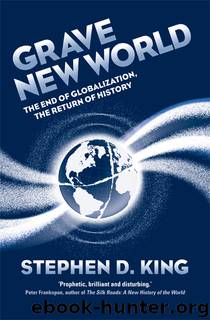Grave New World by Stephen D. King

Author:Stephen D. King
Language: eng
Format: epub
ISBN: 9780300218046
Publisher: Yale University Press
BEYOND WINDRUSH
Across Europe, different approaches to immigration were adopted after the Second World War. But for the most part, they had a common aim: with millions of working-age men and women dead as a result of battle, bombs or concentration camps, there weren’t enough left to support the process of post-war reconstruction. With persistently low unemployment rates, immigration was an obvious answer. In many cases, the process was a reverse of the nineteenth-century story. Back then, Europeans emigrated to the rest of the world. Now, the rest of the world was emigrating to Europe – and Europeans themselves were increasingly hopping across their common borders.
For the UK, many immigrants in the 1950s and 1960s came from its remaining and former colonies. In response to the British Nationality Act of 1948, which gave Commonwealth citizens free entry into the UK, the first batch of West Indian workers arrived on the SS Empire Windrush. Over the next two decades, large numbers also arrived from the Indian subcontinent, a mixture of Hindus from Gujarat, Sikhs from the East Punjab and Muslims from both Pakistan and modern-day Bangladesh (not that the indigenous British population was very interested in the distinctions between these various groups). And in 1972, thanks to Idi Amin’s brutal racism, over 27,000 East African Asians, whose forebears had arrived in East Africa under nineteenth-century British colonial rule, found sanctuary in the UK. In Amin’s own words, ‘Our deliberate policy is to transfer the economic control of Uganda into the hands of Ugandans, for the first time in our country’s history.’
Still, Amin was not the only politician suspicious of the ‘foreigner’ in his midst. Enoch Powell, in his notorious April 1968 ‘Rivers of Blood’ speech, argued:
For reasons they could not comprehend [the existing UK population] found themselves made strangers in their own country … The Race Relations Bill … is the means of showing that the immigrant communities can organise to consolidate their members, to agitate and campaign against their fellow citizens, and to overawe and dominate the rest with the legal weapons which the ignorant and the ill-informed have provided. As I look ahead, I am filled with foreboding: like the Roman, I seem to see ‘the River Tiber foaming with much blood’.
Powell was also happy to quote a constituent who suggested that, ‘In this country in 15 or 20 years’ time the black man will have the whip hand over the white man.’7 Powell’s whole speech is littered with references to Negroes, Sikhs and differences ‘of colour’, with no mention whatsoever of any ‘perils’ associated with white immigration. Plenty at the time thought he was a man of brilliant insight, but in truth he was no more than a ghastly racist who happily pandered to others’ fears and insecurities. To his credit, Edward Heath, later to become prime minister but at the time leader of the opposition, sacked Powell from his shadow front-bench team the day after the speech.8
Fears and insecurities tend, irrationally, to change over time. In the early
Download
This site does not store any files on its server. We only index and link to content provided by other sites. Please contact the content providers to delete copyright contents if any and email us, we'll remove relevant links or contents immediately.
The Secret History by Donna Tartt(16611)
The Social Justice Warrior Handbook by Lisa De Pasquale(11486)
Thirteen Reasons Why by Jay Asher(7783)
This Is How You Lose Her by Junot Diaz(5754)
Weapons of Math Destruction by Cathy O'Neil(5032)
Zero to One by Peter Thiel(4818)
The Myth of the Strong Leader by Archie Brown(4786)
Promise Me, Dad by Joe Biden(4441)
Stone's Rules by Roger Stone(4413)
Beartown by Fredrik Backman(4406)
How Democracies Die by Steven Levitsky & Daniel Ziblatt(4393)
The Fire Next Time by James Baldwin(4338)
100 Deadly Skills by Clint Emerson(4072)
A Higher Loyalty: Truth, Lies, and Leadership by James Comey(4027)
Rise and Kill First by Ronen Bergman(4009)
The David Icke Guide to the Global Conspiracy (and how to end it) by David Icke(3876)
The Farm by Tom Rob Smith(3870)
Secrecy World by Jake Bernstein(3774)
The Doomsday Machine by Daniel Ellsberg(3726)
